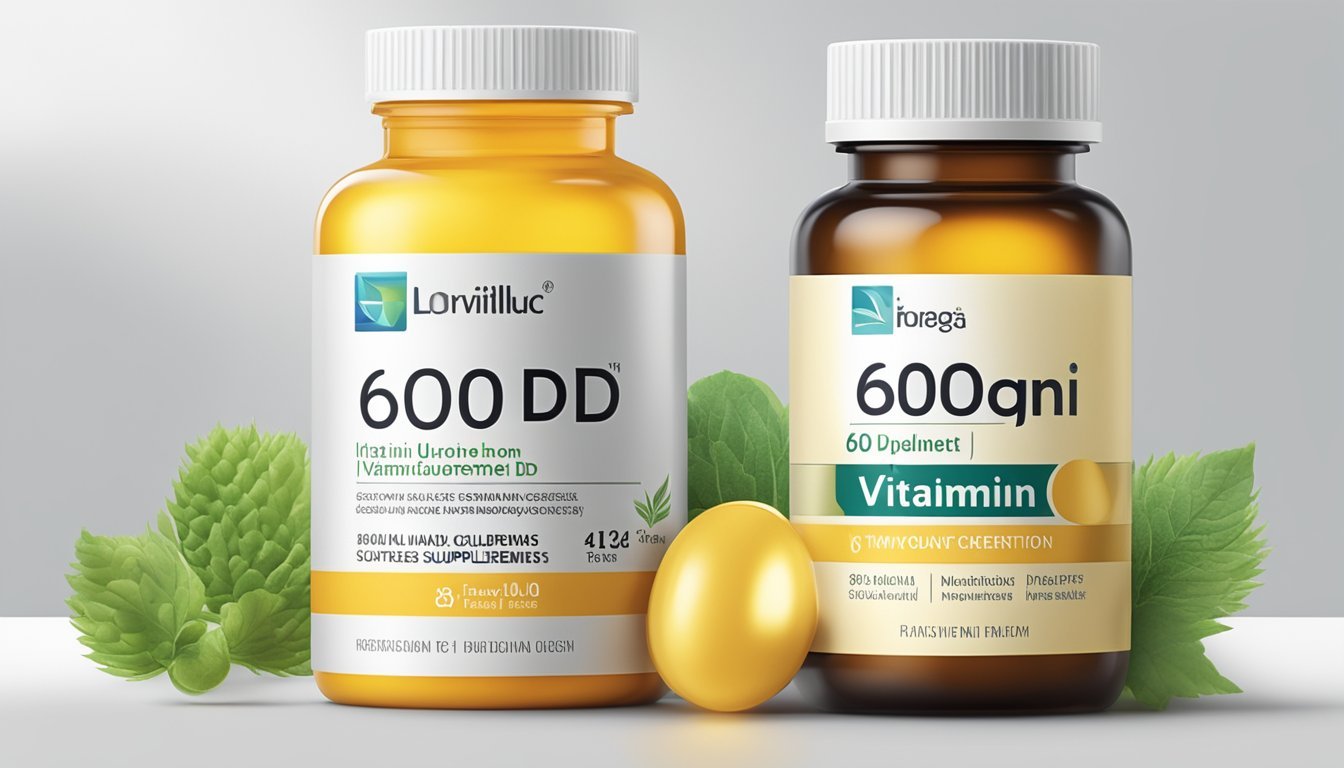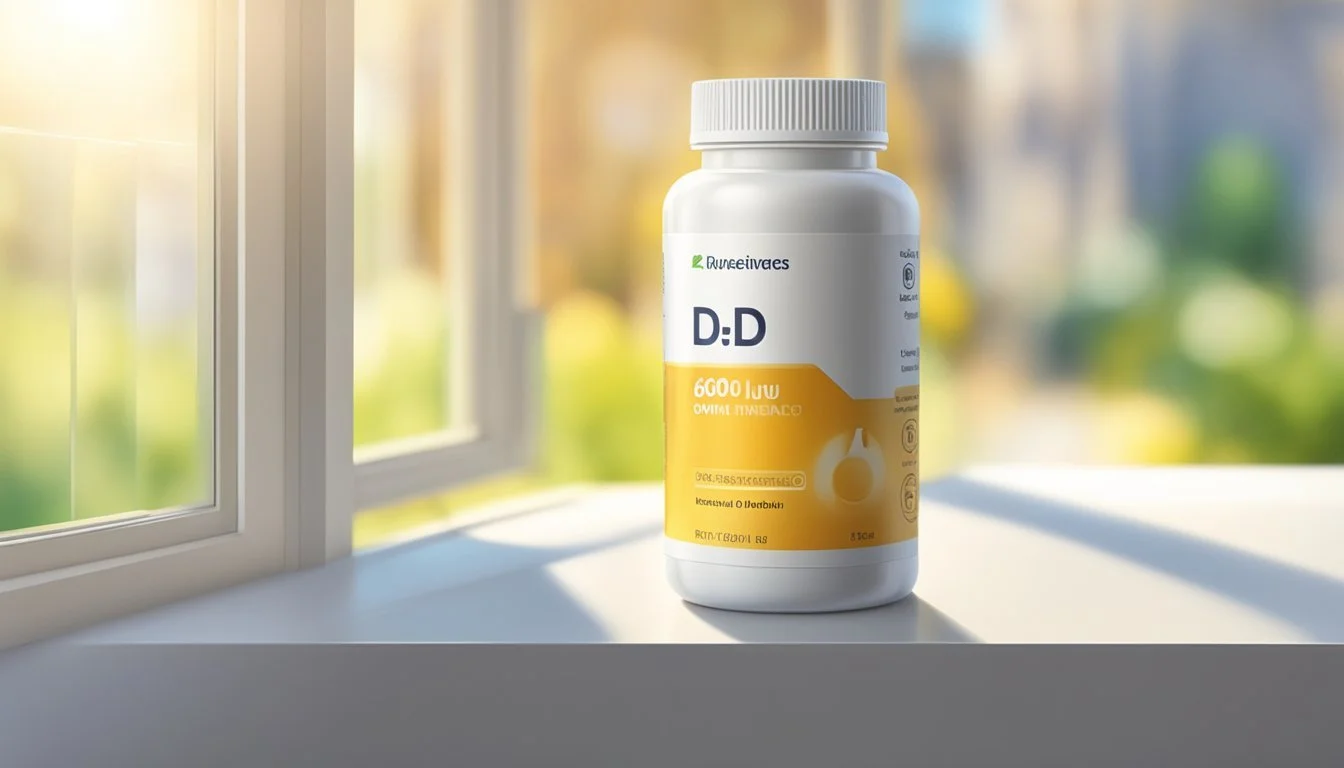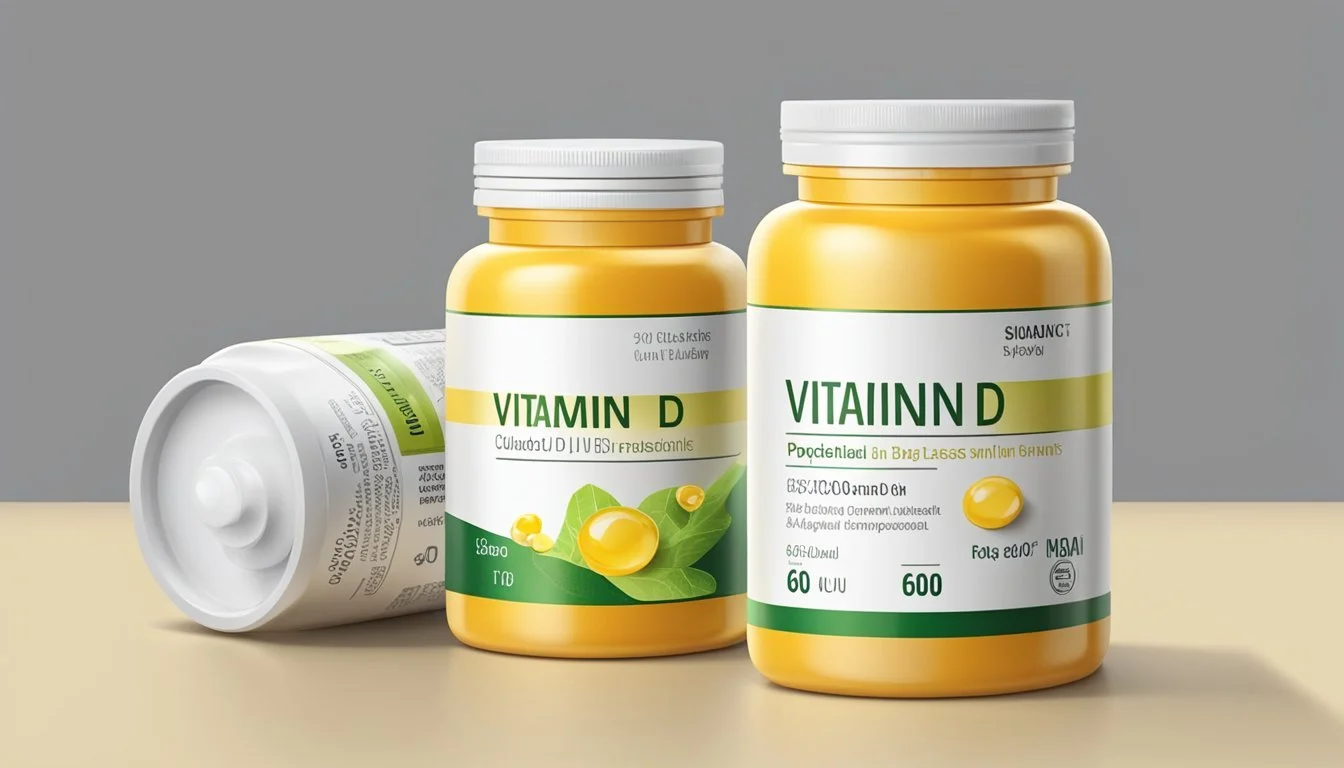Vitamin D Supplements: Is 600 IU the Right Dose for You?
Vitamin D supplements play a crucial role in maintaining optimal health, especially for those who don't get enough sunlight exposure. The recommended daily amount of vitamin D for most adults aged 1 to 70 years is 600 IU (international units). This dosage helps support bone health, immune function, and overall well-being.
Many vitamin D supplements on the market offer 600 IU per serving, aligning with the recommended dietary allowance. These supplements come in various forms, including softgels, capsules, and tablets, making it easy for individuals to incorporate them into their daily routine. Some products may contain higher doses, ranging from 1,000 to 5,000 IU, but it's essential to consult with a healthcare provider before exceeding the recommended intake.
Taking vitamin D supplements can be particularly beneficial for people with limited sun exposure, those with darker skin tones, and older adults. The health benefits of maintaining adequate vitamin D levels include improved calcium absorption, stronger bones, and potential support for immune function. While food sources like fatty fish and fortified dairy products contain vitamin D, supplements offer a convenient way to ensure consistent intake.
Understanding Vitamin D
Vitamin D is a crucial nutrient that plays multiple roles in maintaining health. It exists in different forms and can be obtained from various sources.
Forms of Vitamin D: D2 and D3
Vitamin D comes in two main forms: D2 (ergocalciferol) and D3 (cholecalciferol). D2 is plant-derived and found in some fortified foods. D3 is produced in the skin when exposed to sunlight and is also present in animal-based foods.
D3 is considered more effective at raising blood levels of vitamin D. Both forms are converted to the active form, calcitriol, in the body.
Role of Vitamin D in the Body
Vitamin D is essential for calcium absorption and bone health. It helps maintain strong bones and teeth. This fat-soluble vitamin also supports immune function and reduces inflammation.
Vitamin D regulates cell growth and plays a role in neuromuscular function. It may help protect against certain cancers and chronic diseases.
The body produces vitamin D through a complex process involving the skin, liver, and kidneys.
Vitamin D Deficiency: Risks and Populations Affected
Vitamin D deficiency can lead to weakened bones, increased risk of fractures, and muscle weakness. It may also contribute to depression and a weakened immune system.
Certain groups are at higher risk of deficiency:
Older adults
People with limited sun exposure
Individuals with dark skin
Those with certain medical conditions
Obesity and malabsorption disorders can also increase the risk of vitamin D deficiency.
Sources of Vitamin D: Sunlight, Food, and Supplements
Sunlight is the primary natural source of vitamin D. The skin produces vitamin D when exposed to UVB rays. Factors like time of day, season, and latitude affect vitamin D production from sunlight.
Food sources of vitamin D include:
Fatty fish (salmon, tuna, mackerel)
Egg yolks
Fortified dairy products and cereals
Supplements are available in D2 and D3 forms. The recommended daily intake for most adults is 600-800 IU. Higher doses may be needed for some individuals.
Health Impacts of Vitamin D
Vitamin D plays a crucial role in numerous bodily functions and has far-reaching effects on overall health. Its impacts range from maintaining strong bones to potentially reducing the risk of certain diseases.
Vitamin D and Bone Health
Vitamin D is essential for calcium absorption and bone mineralization. It helps prevent conditions like osteoporosis, rickets, and osteomalacia. Without adequate vitamin D, bones can become weak and brittle, increasing the risk of fractures.
Children require vitamin D for proper bone development. Adults need it to maintain bone density and strength. Older adults, especially postmenopausal women, are at higher risk of vitamin D deficiency and related bone issues.
Vitamin D supplements, often combined with calcium, can help prevent bone loss and reduce fracture risk in older adults.
Vitamin D's Role in Disease Prevention
Research suggests vitamin D may play a role in preventing various diseases. It supports immune system function, potentially reducing the risk of infections and autoimmune disorders.
Some studies indicate vitamin D might help lower the risk of certain cancers, though more research is needed. There's also evidence linking adequate vitamin D levels to a reduced risk of heart disease and type 2 diabetes.
Vitamin D deficiency has been associated with an increased risk of depression, particularly in older adults. However, the exact relationship between vitamin D and mental health requires further investigation.
Vitamin D Benefits for Specific Populations
Pregnant women need sufficient vitamin D for fetal development and to reduce the risk of complications. Breastfed infants may require vitamin D supplements, as breast milk alone might not provide enough.
Older adults often have a higher vitamin D requirement due to decreased skin synthesis and reduced dietary intake. They may benefit from supplements to maintain bone health and muscle strength.
People with darker skin tones produce less vitamin D from sunlight exposure and may need higher supplement doses. Those with limited sun exposure, such as shift workers or individuals who are housebound, might also require vitamin D supplementation.
Vitamin D Supplements
Vitamin D supplements come in various forms and dosages to support bone health and overall well-being. Choosing the right supplement and dosage is crucial for meeting individual needs and dietary preferences.
Choosing the Right Vitamin D Supplement
Vitamin D supplements are available in two main forms: ergocalciferol (D2) and cholecalciferol (D3). D3 is generally considered more effective at raising blood levels of vitamin D. It's typically derived from animal sources, while D2 is plant-based.
When selecting a supplement, consider the following:
Form: Tablets, capsules, liquid, or gummies
Dosage: Ranging from 400 IU to 5000 IU per serving
Additional ingredients: Some products include calcium or other nutrients
Third-party testing: Look for certifications ensuring quality and purity
For vegans and vegetarians, D2 supplements or plant-based D3 options derived from lichen are available.
Optimal Dosages and Recommended Dietary Allowance
The Recommended Dietary Allowance (RDA) for vitamin D varies by age:
400 IU for infants 0-12 months
600 IU for individuals 1-70 years old
800 IU for adults over 70 years
These recommendations aim to maintain adequate blood levels of vitamin D for most healthy individuals. However, some people may require higher doses.
Factors influencing vitamin D needs include:
Sun exposure
Skin pigmentation
Age
Body weight
Certain medical conditions
It's essential to consult a healthcare provider before starting high-dose supplementation, as excessive vitamin D intake can lead to toxicity.
Vitamin D Supplementation for Specific Diets
Different dietary patterns may require special consideration for vitamin D supplementation:
Vegan and vegetarian diets: These diets often lack natural food sources of vitamin D. Vegans should opt for D2 supplements or plant-based D3. Vegetarians can choose either D2 or D3.
Dairy-free diets: Many dairy alternatives are fortified with vitamin D, but supplementation may still be necessary.
Gluten-free diets: Ensure chosen supplements are certified gluten-free if needed.
For individuals with dietary restrictions, it's crucial to read labels carefully and choose supplements that align with their specific needs and ethical considerations.
Factors Affecting Vitamin D Absorption
Several key factors influence how effectively the body absorbs and utilizes vitamin D from supplements. Diet, lifestyle choices, and certain medications can all play crucial roles in this process.
Influence of Diet and Lifestyle
Fat intake significantly impacts vitamin D absorption. As a fat-soluble vitamin, it requires dietary fat for optimal uptake. Consuming vitamin D supplements with a meal containing healthy fats can enhance absorption.
Obesity may hinder vitamin D absorption. Excess body fat can sequester the vitamin, reducing its availability in the bloodstream.
Sun exposure affects vitamin D levels. While not directly related to supplement absorption, it influences overall vitamin D status. Melanin in darker skin reduces vitamin D production from sunlight.
Gastric bypass surgery can impair nutrient absorption, including vitamin D. Patients may require higher supplemental doses to maintain adequate levels.
Interactions with Medications
Certain medications can interfere with vitamin D absorption or metabolism. Glucocorticoids, often used to treat inflammatory conditions, may reduce calcium absorption and vitamin D activation.
Some anticonvulsants and HIV medications can accelerate vitamin D breakdown in the liver, potentially leading to deficiency.
Cholesterol-lowering statins may affect vitamin D levels, though the relationship is complex and not fully understood.
Mineral supplements, particularly calcium and phosphorus, can interact with vitamin D. While these minerals work synergistically with vitamin D, excessive intake may interfere with absorption.
Potential Risks and Side Effects
While vitamin D supplements at 600 IU are generally safe, excessive intake can lead to adverse effects. Understanding the risks of toxicity and proper management is crucial for those taking vitamin D regularly.
Vitamin D Toxicity: Causes and Symptoms
Vitamin D toxicity, also known as hypervitaminosis D, occurs when blood levels become too high. This typically results from taking megadoses of supplements rather than from sunlight exposure or diet. Symptoms include:
• Nausea and vomiting • Weakness and fatigue • Confusion and disorientation • Kidney problems
Excess vitamin D can cause hypercalcemia, a condition where calcium levels in the blood become elevated. This may lead to:
• Constipation or stomach pain • Bone pain • Kidney stones • High blood pressure
Regular blood tests can help monitor vitamin D levels and prevent toxicity.
Managing Overdose and Recovery
If vitamin D toxicity is suspected, immediate medical attention is necessary. Treatment typically involves:
Stopping vitamin D supplementation
Reducing calcium intake
Increasing fluid intake to promote calcium excretion
In severe cases, hospitalization may be required. Medications to lower blood calcium levels or corticosteroids might be prescribed. Recovery time varies depending on the severity of the overdose.
To prevent toxicity, stick to recommended dosages and consult a healthcare provider before starting any new supplement regimen. Regular monitoring can help detect potential issues early.
Supplement Quality and Standards
Vitamin D supplements vary widely in quality and standards. Consumers should be aware of key factors to ensure they choose safe, effective products that deliver the stated dose.
Certifications and Third-Party Testing
Reputable vitamin D supplements often carry certifications from independent organizations. Look for seals from USP, NSF International, or ConsumerLab. These indicate the product has been tested for purity, potency, and quality. Third-party testing verifies ingredient accuracy and checks for contaminants. Some manufacturers voluntarily submit their products for additional scrutiny.
Many vitamin D3 supplements undergo stability testing to ensure potency throughout shelf life. Quality brands may disclose their testing methods and results. Research shows that supplements meeting rigorous standards are more likely to contain the stated amount of vitamin D3.
How to Evaluate Vitamin D Supplement Labels
Reading supplement labels carefully is crucial for choosing high-quality vitamin D products. Check for clear dosage information, typically listed in International Units (IU) or micrograms (mcg). A 600 IU dose is common for many adults.
Look for the specific form of vitamin D used - D3 (cholecalciferol) is generally preferred over D2. Examine the ingredient list for unnecessary fillers or allergens. Reputable brands list country of manufacture and expiration dates.
Pay attention to storage instructions, as vitamin D can degrade with heat or light exposure. Some labels indicate if the supplement is vegetarian/vegan-friendly or sustainably sourced. Comparing labels across brands can reveal differences in quality and value.
Professional Guidance and Personal Health
Seeking expert advice and tailoring vitamin D intake to individual needs are crucial steps in optimizing health. Healthcare professionals can provide personalized recommendations based on specific factors and medical conditions.
When to Consult a Healthcare Professional
Individuals should consult a healthcare professional before starting or changing vitamin D supplementation. This is especially important for those with certain medical conditions, taking medications, or experiencing symptoms of deficiency. A doctor or registered dietitian can assess vitamin D status through blood tests, evaluating 25-hydroxyvitamin D levels. They may recommend testing if risk factors are present or symptoms suggest a deficiency.
Healthcare providers can also advise on potential interactions with other medications and guide patients on the appropriate dosage based on their unique health profile.
Personalized Vitamin D Recommendations
Vitamin D needs vary widely among individuals. Factors influencing requirements include age, skin tone, sun exposure, diet, and health conditions. Healthcare professionals consider these elements when making personalized recommendations.
For some, the recommended dietary allowance of 600 IU may be sufficient. Others might require higher doses to achieve optimal blood levels. A registered dietitian can help create a balanced diet incorporating vitamin D-rich foods and suggest appropriate supplementation if needed.
Recommendations may change over time, necessitating periodic reassessment of vitamin D status and intake. Regular follow-ups with healthcare providers ensure that supplementation remains tailored to current health needs and goals.
Vitamin D in Specific Contexts
Vitamin D levels and requirements can vary significantly based on environmental factors and global health challenges. These variations impact supplementation needs and strategies.
Seasonal Variations in Vitamin D Levels
During winter months, vitamin D production from sunlight decreases in many regions. This reduction occurs due to less intense UV radiation and reduced outdoor activities.
In northern latitudes, vitamin D synthesis can be negligible from November to February. Individuals may need to rely more heavily on dietary sources and supplements during this time.
Sun exposure remains the most efficient way to boost vitamin D levels. However, balancing sun exposure with skin cancer risk is crucial. Short, frequent exposures are often recommended over longer periods in direct sunlight.
Vitamin D and Global Health Challenges
Vitamin D deficiency is a widespread global health issue. It affects populations across various socioeconomic levels and geographic regions.
The COVID-19 pandemic highlighted the potential role of vitamin D in immune function. Some studies suggested a link between vitamin D status and COVID-19 outcomes, though more research is needed.
In developing countries, vitamin D deficiency often coexists with other nutritional deficiencies. This combination can exacerbate health problems and hinder child growth and development.
Public health initiatives in many countries now include vitamin D supplementation programs. These efforts aim to address deficiencies and improve overall population health.
Innovations in Vitamin D Research
Recent advancements in vitamin D research have uncovered new potential benefits and improved supplementation methods. Scientists continue to explore the compound's effects on various health aspects beyond bone health.
Emerging Studies on Vitamin D Benefits
Research on vitamin D supplementation has expanded beyond its traditional role in bone health. New studies examine its impact on respiratory infections, immune function, and overall health outcomes. A recent randomized controlled trial investigated the effects of different vitamin D doses, including 800 IU daily, on bone density in adults. The results suggest that neither low nor high doses significantly improved bone density in participants with average baseline vitamin D levels.
Scientists are also exploring optimal supplementation methods. Some researchers propose that daily vitamin D intake may be more beneficial than intermittent high-dose supplementation. This approach aims to maintain consistent blood levels of the vitamin over time.
Future of Vitamin D Nutrition
The future of vitamin D nutrition focuses on personalized supplementation strategies. Researchers are developing methods to tailor vitamin D intake based on individual factors such as age, weight, and baseline levels. This approach may lead to more effective supplementation protocols.
Innovations in vitamin D fortification are also on the horizon. Food scientists are working on new ways to incorporate vitamin D into everyday foods, potentially reducing the need for separate supplements. These efforts aim to address vitamin D deficiency on a population level.
Ongoing research explores the potential of vitamin D analogs - synthetic compounds that mimic vitamin D's effects. These may offer targeted benefits with fewer side effects than traditional supplements.
Additional Nutritional Considerations
Vitamin D supplementation works best when combined with complementary nutrients and integrated into a holistic approach to nutrition. Certain foods and nutrients enhance vitamin D's effectiveness, while a balanced strategy can optimize overall health benefits.
Complementary Nutrients for Vitamin D
Calcium absorption is closely linked to vitamin D intake. Fortified foods like milk and cereals often contain both nutrients. Fatty fish, such as salmon and mackerel, provide natural vitamin D alongside omega-3 fatty acids. Egg yolks and mushrooms offer smaller amounts of vitamin D.
Magnesium plays a crucial role in vitamin D metabolism. Green leafy vegetables, nuts, and whole grains are good magnesium sources. Vitamin K2 works synergistically with vitamin D for bone health. It can be found in fermented foods and some animal products.
Integrative Approaches to Supplementation
A multivitamin can provide a balanced mix of nutrients to support vitamin D function. However, individual needs vary, and targeted supplementation may be necessary. Cod liver oil combines vitamin D with vitamin A and omega-3s.
Dietary choices impact vitamin D status. A diet rich in whole foods, including fatty fish, eggs, and fortified products, can boost intake. Sun exposure remains an important source of vitamin D, but skin cancer risks must be considered.
Regular blood tests can help monitor vitamin D levels and guide supplementation. Consulting a healthcare provider ensures a personalized approach that accounts for individual health conditions and medications.






